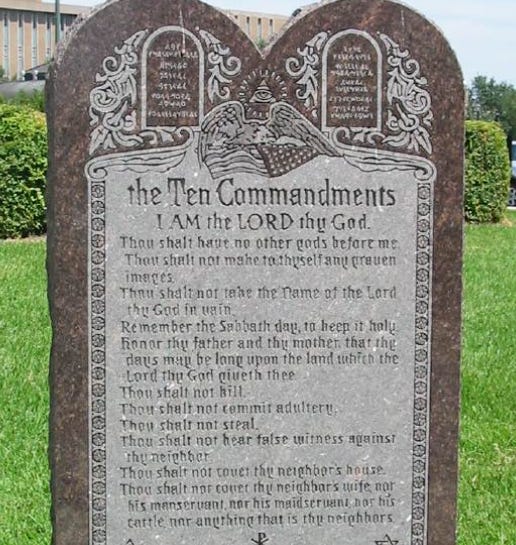New Texas Law Requires Display of Ten Commandments In All Public School Classrooms
The governor signed the measure a day after a federal appeals court ruled that a Louisiana law requiring that the Ten Commandments be displayed in classrooms violated the Constitution.

By Gary Gately
Every public school classroom in Texas would be required to display the Ten Commandments under a bill Governor Greg Abbott signed into law Saturday.
The Republican governor signed the measure just a day after a three-judge panel of the 5th U.S. Circuit Court of Appeals in New Orleans blocked enforcement of a law requiring the Ten Commandments to be displayed in every classroom of the state’s public schools and universities.
The appeals court panel unanimously upheld a U.S District Court judge’s ruling that the law violates the First Amendment’s Establishment Clause, which prohibits the government from endorsing a religion or enacting laws favoring one religion over another.
Another legal battle over display of the Ten Commandments in public school classrooms and libraries is playing out in Arkansas, where seven families have filed a federal lawsuit, arguing that the requirement violates the separation of church and state.
Supporters of the laws in all three states have argued that the Ten Commandments represent a historical document that forms part of the foundation of U.S. law and thus are educational.
“The focus of this bill is to look at what is historically important to our nation educationally and judicially,” said Texas Republican state Representative Candy Noble, a co-sponsor of the bill. “It is incumbent on all of us to follow God’s law, and I think we would all be better off if we did.”
But opponents counter that the laws favor one religion while alienating those of other faiths.
Rocío Fierro-Pérez, political director at Texas Freedom Network, a progressive organization, said in a statement: “Religion is a sacred practice that should be directed by families and faith leaders, not the Texas government. No child should be told by the state that their beliefs are wrong, or that they don’t belong in their own school. This is government overreach in its most dangerous form.”
The Texas law, which requires that every public school classroom visibly display a poster displaying the Ten Commandments and measuring at least 16 by 20 inches, has won support from conservative Republicans, including President Donald J. Trump.
Republicans in more than a dozen states have introduced legislation this year that would require that the Ten Commandments be displayed in public school classrooms.
The U.S. Supreme Court ruled in Stone v. Graham in 1980 that a Kentucky law requiring that all public schools display the Ten Commandments violated the First Amendment’s Establishment Clause. In the decision, the high court cited the “Lemon test,” from the 1971 case Lemon v. Kurtzman, which stipulated that a law must have a secular legislative purpose, its primary effect must neither advance nor inhibit religion, and it must not foster an excessive government entanglement with religion.
But in 2022, the Supreme Court said it had abandoned the Lemon test when it ruled that a high school football coach in Washington state had a constitutional right to pray at the 50-yard line after his team’s games.
“The Constitution and the best of our traditions counsel mutual respect and tolerance, not censorship and suppression, for religious and nonreligious views alike” Justice Neil M. Gorsuch wrote for the 6-3 majority in Kennedy v. Bremerton School District.
Legal experts predict that the battle over displaying the Ten Commandments in public school classrooms could reach the Supreme Court, which has expanded the role of religion in public life, including in education, in a series of rulings in recent years.
After the Louisiana decision, Rachel Laser, president and CEO of Americans United for Separation of Church and State, said in a statement: “This ruling will ensure that Louisiana families — not politicians or public school officials — get to decide if, when and how their children engage with religion.”
But Liz Murrill, Louisiana’s Republican attorney general, said she “strongly disagrees” with the decision and would immediately seek review from the full 5th Circuit appeals court and, “if necessary,” the U.S. Supreme Court.
The debate over the Ten Commandments laws comes as part of efforts by conservative Republicans to incorporate religion in public school education.
Abbott also signed into law Saturday a bill that allows school districts to provide students and staff a daily voluntary period of prayer or time to read a religious text during school hours.
Last year, Oklahoma’s school system incorporated the King James Bible into school curricula for all fifth- to 12th-grade students, and Utah’s Governor signed a bill allowing history teachers to use the Ten Commandments in instruction.
Lawmakers in several other states have introduced measures to incorporate the Bible into instruction, set aside time for prayer in schools and allow school districts to hire religiously affiliated chaplains to counsel students during the school day.


